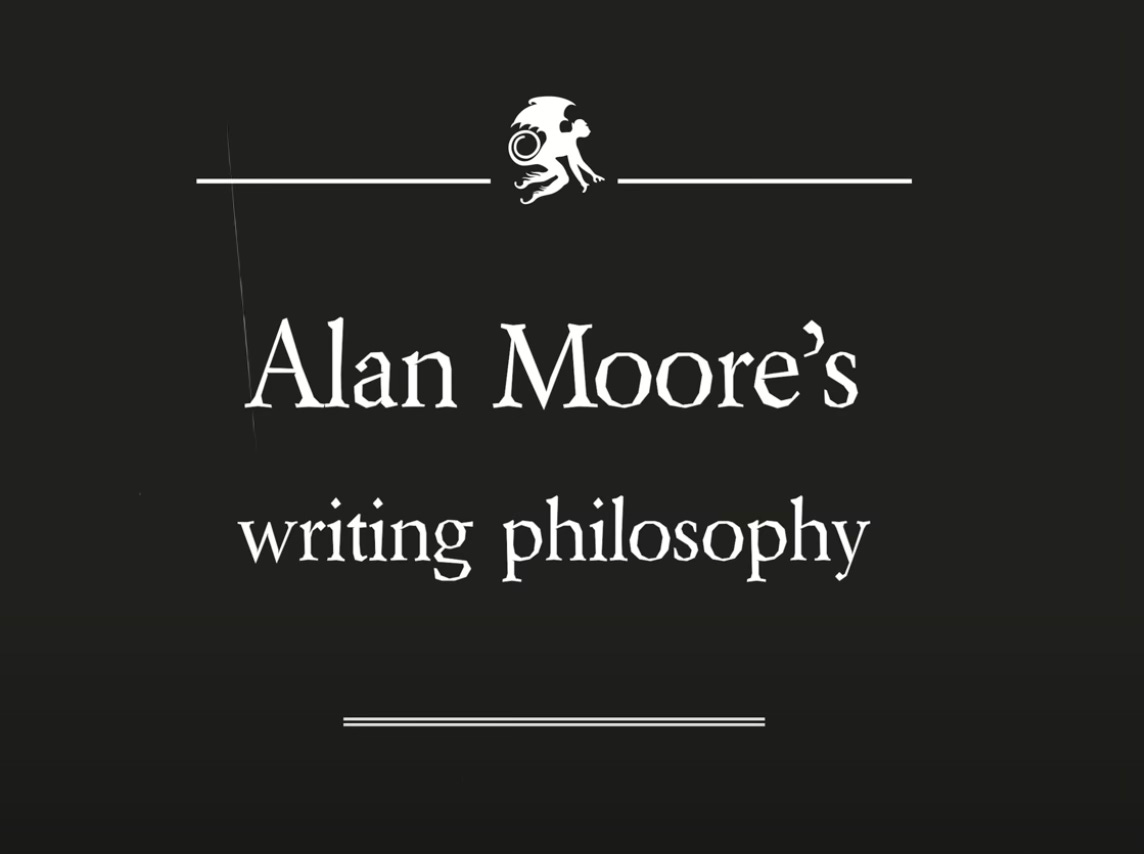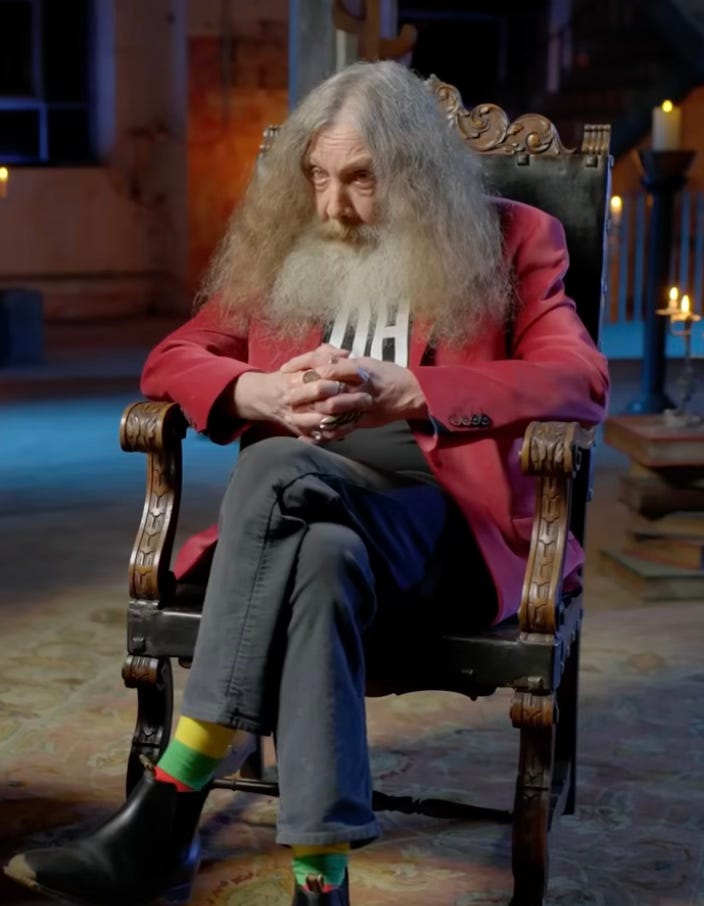Confessions of a Magician
We're not as weird as you think.
I’m a big fan of Alan Moore. Not his books—I’ve read a number of them and while I find his craft to be excellent and admirable, the stories he tells just aren’t for me. I’m not his intended audience, and that’s okay. But I am a huge fan of Moore himself—Moore the philosopher, Moore the craftsman, Moore the magician. And yes, he really is an actual, for-real, no-shit magician. And he’s an exceptionally thoughtful and effective magician, at that.
I’m an actual, for-real, no-shit magician, too. That is to say: I practice magic as an everyday part of my life, in the same way some other people practice prayer or meditation. In fact, I think prayer and meditation and magic are all parts of the same thing, limbs of the same body, though I don’t know what to call that body. “Spirituality” is probably the best word we have for it in the English language, but it also feels too nebulous to really nail what this stuff is.
I know that some of you will unsubscribe because I just admitted that I practice magic. Any time I mention my practice on my podcast, I lose subscribers. Such an admission either scares people away or it turns them off in disgust. The former camp has been conditioned by the dominance of Christianity in western culture to believe that “people who practice magic” are “bad” in some non-specific yet dark way: spooky evil weirdos who can’t be trusted on any topic because… uh… magic bad? The latter camp instantly comes to see you as a silly, ridiculous person because they think that magicians are trying to get Harry Potter results—making our coffee cups whiz across the room into our hands, for example—which are obviously not physically possible. This, too, is a misunderstanding of what magic actually is, and what it always has been since the dawn of human consciousness. The reality is that magic is just another way for people to commune with the deepest and most essential aspects of their own mind, exactly as in meditation or prayer. But magic gets us to that point of inner communion much more efficiently and effectively than meditation or prayer do. Different strokes for different folks.
I can’t speak for Alan Moore, but for me, the practice of magic is also cultural. I was raised Mormon, and my family’s roots in the religion go all the way back to its founding. My earliest ancestors in the church joined in April 1830, when Joseph Smith moved his fledgling congregation from Harmony, Pennsylvania to Fayette, New York. The Ricks family appear on the first official roll of church members; my people have been fully engaged with Mormonism right from the start. I am no longer a Mormon, but like all people, I am still a product of the culture in which I was raised, and perhaps (the mind is a funny, unknowable thing) a product of my ancestors’ influence.
Today, mainstream Mormons will furiously deny that ritual magic has anything to do with their religion. Since the middle of the 20th century, the church has been aggressively courting the acceptance of Evangelical Christianity, to the spiritual and cultural detriment of Mormons and Mormonism. Part of that courtship has involved a rigorous rejection of many aspects of the church’s history and core philosophies, and that rejection has included the shunning of anything that hints at magic. But the most cursory study of Mormon history—particularly any study of its founder Joseph Smith and the church’s earliest years—will reveal the very obvious and even essential connections between the religion and western ritual magic (especially Hermeticism, Kabbalah, and Appalachian folk magic.) In my opinion, Mormonism is a syncretism between Christianity and ritual magic. I even wrote a novel about it; that’s how clear the connections are to me.
Growing up, my family incorporated ritual magic into our daily lives in ways that might surprise people who have no direct experience of Mormonism, or who only experienced a more mainstream version without the generations-long connection to the original church, which was far more open about its Hermetic and folk-magic leanings. Making talismans and sigils (which were received “from God” via prayer) and developing elaborate, personal and specific rituals surrounding prayer was just… normal, especially for my dad, who had an intensely spiritual side and was as powerfully drawn to the esoteric side of Mormonism as I am. I left the religion in my early 20s due to lack of belief in the central God, but I kept what still felt authentic and spiritually effective to me—the deep engagement with the mystery of the mind, which we call “magic” because damn it, there isn’t a better word for it yet and we have to make do. My tentative exploration of magic detached from religion began in my mid to late twenties and continues to this day, but it was only in the past ten years or so that I felt comfortable talking about it openly, and then only because I found a way of expressing my connection that seemed to be accepted (albeit with a heavy dose of side-eye) by other people: “It’s cultural. I was raised with this. I’m not cosplaying as a witch on Instagram, or whatever.”
No shade to the Instagram witches out there—you do you, friends.
And for the record, I don’t refer to myself as a witch, though I don’t mind when other people use the words “witch” or “witchcraft” to describe me and my practices. I think that’s the most comfortable conception many modern folks have of ritual magic, so it’s fine with me if those words make them feel cozy enough to not unsubscribe to my podcast or my Substack (ha ha.) I don’t use any particular words to describe myself or my practice, other than “magician” and “magic.” And I think that’s a big part of what makes my practice so effective and satisfying: I don’t limit it or myself by assigning limiting words.
Because words are—truly, literally, and very directly—the things that make our reality.
Any magician knows this. Some folks who aren’t magicians grasp this truth with varying degrees of clarity. But for magicians, the potency of words is both an obvious and a sacred thing.
Alan Moore scratches the surface of this concept in this video, which I always love to share. It’s pretty short and it gets right to the point, and it presents the concept of words as creative force in a way that many people can connect to, regardless of their cultural background or their personal feelings about magic. If you’re a fellow writer and you’ve got nine minutes to kill, watch it and see what you think. I bet you’ll agree with more than you disagree with, which might be a surprise from a video about magic made by a lifelong magician. (Despite Moore’s epic, wizardly hairstyle and his bright socks, we really aren’t as weird or detached from reality as most people think us to be.)
What really gets me about Moore’s interview here is this last bit:
“In my estimation, writing and magic are practically the same thing. I would like to think that the current generation of aspiring writers will not sell themselves short in this, that you should never think of yourself as purely an entertainer for hire who’s lucky to have the work. You should try to remember the tradition you’re becoming part of. You should try to remember that a writer can change the world with their writing. Think of the books that have completely changed human history and see yourself in that light, because if you are a writer, then the substances that you are handling, the things that you are juggling—you are having an effect upon human history and the entirety of the human future.”
This is how I have always approached my writing, from the start—and perhaps that’s not surprising from a magician. Words are the creative force in the universe; I have always used mine with purpose. Granted, I started out writing under a pen name, deliberately producing that “entertainer” stuff because it was the fastest way to make money, and if I was making money by writing then I could do nothing but write. The stuff I wrote for the sake of entertainment and money was always created with the purpose of providing financial support so I could dedicate as much time and energy as possible to my real work: writing stuff that might hopefully change the world for the better. I am now at a point in my career where I am able to imbue everything I write with that sacred, transformative purpose. Every morning when I sit down at my writing desk, I am engaging in prayer and meditation and magic, and I am putting my best effort into my most sincere and sacred work: to effect change through words.
Whether you see this kind of work as magic or as something else, I hope you are doing the same, because so many things in this world need changing, and through the stories we tell ourselves and the stories we tell each other, we have the power to change it.




